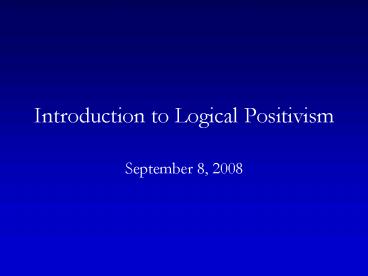Introduction to Logical Positivism - PowerPoint PPT Presentation
1 / 22
Title:
Introduction to Logical Positivism
Description:
Empiricism I experience is the source of all knowledge. ... Analyticity. concerns epistemic features of sentence. A prioricity ... – PowerPoint PPT presentation
Number of Views:182
Avg rating:3.0/5.0
Title: Introduction to Logical Positivism
1
Introduction to Logical Positivism
- September 8, 2008
2
Empiricism
Empiricism I experience is the source of all
knowledge. Empiricism II sensations (e.g.,
patches of color) are all that the mind has
access to.
II implies I. I does not imply II.
3
1. If empiricism is false, then there is
non-experiential knowledge. 2. There couldnt be
non-experiential knowledge.----------------------
--------------------------------------------------
---- 3. Thus, its not the case that empiricism
is false (e.g., empiricism is true).
4
- Empiricism
- Skeptical problems
- Mathematical problems
Logical Positivism
The Vienna Circle
5
(No Transcript)
6
The Analytic/Synthetic Distinction Analytic
Sentence a sentence whose truth- value is
determined solely by the meaning of the
terms. Synthetic Sentence a sentence whose
truth- value is not determined solely by the
meaning of the terms.
7
Examples
If it is raining, then it is raining. Either
Obama will win or it is not the case that Obama
will win. All unmarried men are
unmarried. All bachelors are unmarried.
8
Examples
If it is raining, then it is raining. Either
Obama will win or it is not the case that Obama
will win. All unmarried men are
unmarried. All bachelors are unmarried.
9
Necessary/Contingent Distinction A sentence is
necessarily true iff it couldnt have been
false. (or iff it is true in all possible
worlds) A priori/A posteriori Distinction A
sentence is a priori iff it can be known
independent of experience.
10
(No Transcript)
11
Verifiability Theory of Meaning
Basis For Verifiability Theory of Meaning A
non-analytic sentence, S, is meaningful iff S
bears relation R to statements the truth or
falsity which can be determined directly by
simple observation.
12
Basis For Verifiability Theory of Meaning A
non-analytic sentence, S, is meaningful iff S
bears relation R to statements the truth or
falsity which can be determined directly by
simple observation.
Example S The ratio of menwomen in Herter
111 is 11. Is this meaningful? There are n
men in Herter 111. ? further observations
support this There are m women in Herter
111. ? further observations support this If m
n then this entails that the sentence is true.
If m ? n then this entails that the sentence is
false.
13
A non-analytic sentence, S, is meaningful iff S
bears relation R to statements the truth or
falsity which can be determined directly by
simple observation.
Example This block is square. Example The
Absolute is full potentiality.
Relation R relation of verification or
falsification
14
A non-analytic sentence, S, is meaningful iff S
is verified or falsified by statements the truth
or falsity which can be determined directly by
simple observation.
15
A non-analytic sentence, S, is meaningful iff S
is verified or falsified by statements the truth
or falsity which can be determined directly by
simple observation.
Can determine in principle, or can determine in
practice? Example There are mountains on the
dark side of the moon.
16
A non-analytic sentence, S, is meaningful iff S
is verified or falsified by statements the truth
or falsity which can be determined directly by
simple observation.
Why observation? What counts as direct simple
observation? Example This ball weighs 10 kg.
Observation 1 If I take this ball and put it on
the scale, the scale will read 10 kg.
Observation 2 If I seem to be moving what look
to be my hands towards the circle-shaped patch of
gray in my visual field and then appear to be
grasping this patch of gray and then appear to
move this patch towards what appears to be a
scale, then on the front of what appears to be a
scale, I will see the following image 10 kg.
17
A non-analytic sentence, S, is meaningful iff S
is verified or falsified by statements the truth
or falsity which can be determined directly by
simple observation.
Conclusive Verifiability A sentence S is
conclusively verified iff there is some finite,
consistent set O of observation statements such
that O deductively entails S. Conclusive
FalisifiabilityA sentence S is conclusively
falsified iff there is some finite, consistent
set O of observation statements such that O
deductively entails S.
18
A non-analytic sentence, S, is meaningful iff S
is verified or falsified by statements the truth
or falsity which can be determined directly by
simple observation.
Weak Verifiability A sentence S is verified iff
S together with other true observation sentences
deductively entails some true observation
sentence. Weak Falsifiability A sentence S is
falsified iff S together with other true
observation sentences deductively entails some
false observation sentence.
19
A non-analytic sentence, S, is meaningful iff S
is verified or falsified by statements the truth
or falsity which can be determined directly by
simple observation.
Inductive Verifiability A sentence S is
inductively verified iff there is some finite,
consistent set O of observation statements such
that O inductively supports S. Inductive
FalisifiabilityA sentence S is inductively
falsified iff there is some finite, consistent
set O of observation statements such that O
inductively supports S.
20
Question What does the Verifiability Principle
rule out as meaningless? (a) The Absolute is
full potentiality. (b) Murder is wrong. (c)
God exists. (d) God does not exist. (e)
Ultimately, there is only one substance.
21
Positivism and Science
- Scientific reasoning just like everyday
reasoning. - Science tracks patterns in our experiences.
- Strong distinction between observational and
theoretical language. - Logic will make sense of science.
- Deductive/Inductive Logic
- Justification/Discovery
- what every scientist seeks, and seeks alone,
arethe rules which govern the connection of
experiences, and by which alone they can be
predicted. Moritz Schlick
22
For next time Schlick, Positivism and Realism
(sec II)































